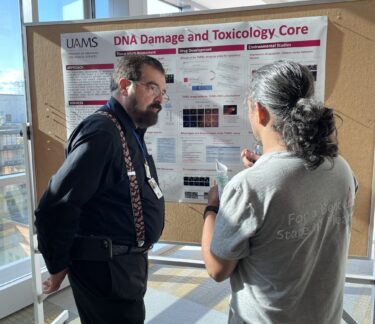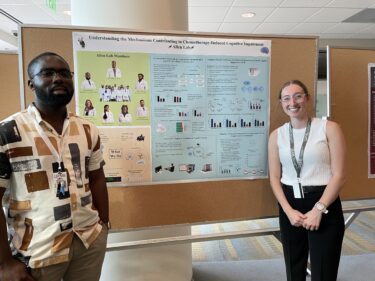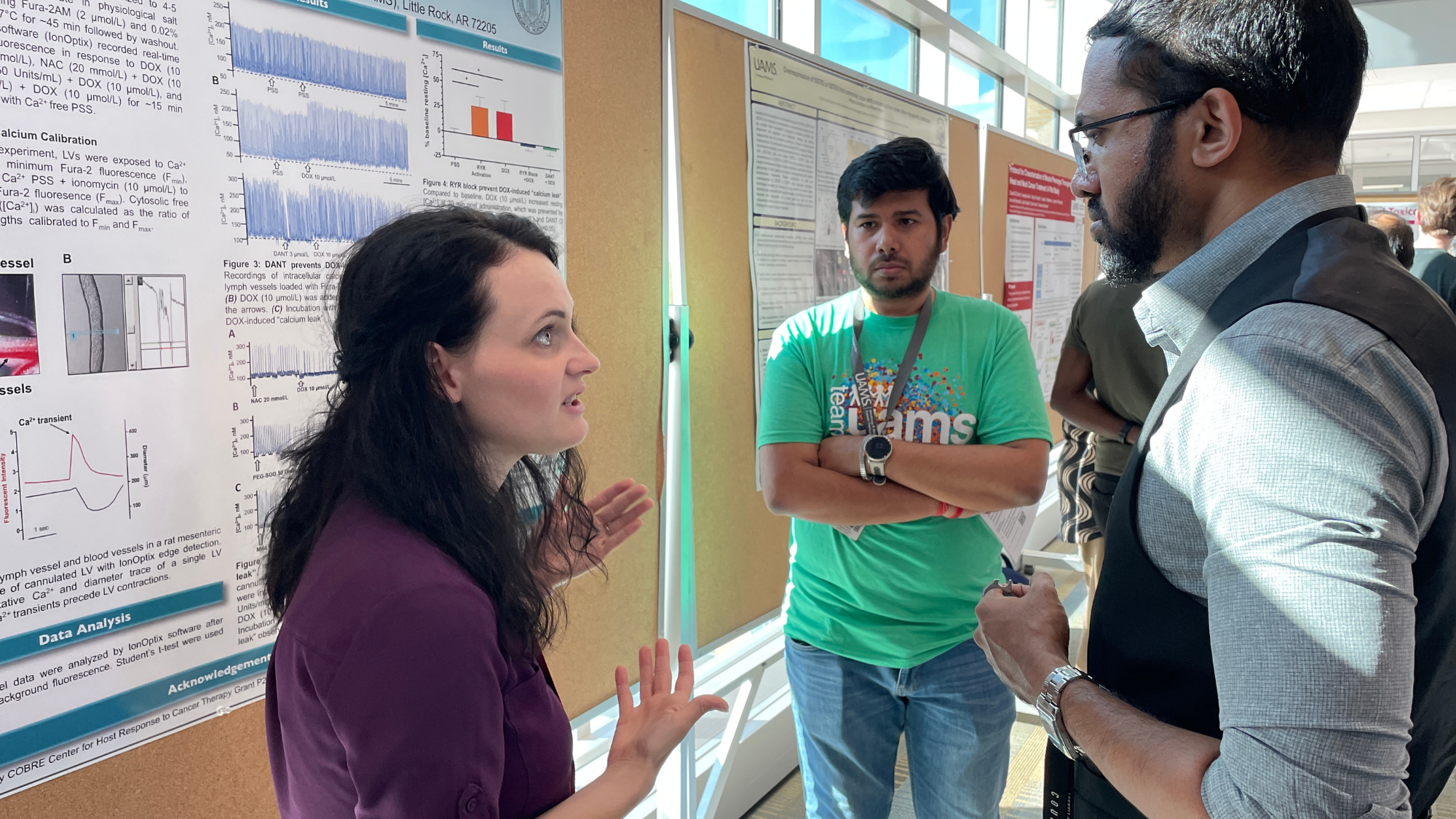Symposium Showcases Promising Research Aimed at Reducing Cancer Therapy Side Effects
| What is worse? Cancer or cancer treatment?
Ask any patient treated with chemotherapy, and the answer may be the treatment. Common side effects of chemotherapy include pain, fatigue, hair loss, mouth sores, bowel issues as well as nerve, muscle, cell and organ damage.
And that’s just chemotherapy. Conventional X-ray radiation, a treatment needed by half of all cancer patients, can cause scarring of the lungs and other injuries to any organ in the radiation field.
 “Cancer treatments are much better than they used to be, and patients are living longer,” said Marjan Boerma, Ph.D., director of the Center for Studies of Host Response to Cancer Therapy at UAMS. “But patients and survivors can still experience physical suffering, both during and sometimes years after treatment.”
“Cancer treatments are much better than they used to be, and patients are living longer,” said Marjan Boerma, Ph.D., director of the Center for Studies of Host Response to Cancer Therapy at UAMS. “But patients and survivors can still experience physical suffering, both during and sometimes years after treatment.”
Boerma, a professor and director of the Division of Radiation Health in the UAMS College of Pharmacy Department of Pharmaceutical Sciences, leads a highly specialized team of UAMS researchers focused on cancer therapy side effects.
Funded by a five-year $11.4 million grant from the Centers for Biomedical Research Excellence (COBRE), a program of the National Institutes of Health, the Center for Studies of Host Response to Cancer Therapy is the only one of its kind that examines the mechanisms by which various types of cancer therapies cause toxicity in order to develop strategies to predict, prevent or reverse these side effects.
The COBRE center shared the innovative work of 11 UAMS faculty at the Showcase of Medical Discoveries, held Sept. 25 at the Winthrop P. Rockefeller Cancer Institute. The following projects were featured, as well as information about the four core facilities in the center:
- Amanda Stolarz, Pharm.D., Ph.D., “Doxorubicin and Lymphedema”
- Antiño Allen, Ph.D., “Understanding the Mechanisms Contributing to Chemotherapy-induced Cognitive Impairment”
- Brendan Frett, Ph.D., “Tk-850: A Novel Small Molecule Inhibitor for Mitigating Radiation-Induced Lung Fibrosis”
- David Church, Ph.D., “Protocol for Characterization of Muscle Phenotype Throughout Head and Neck Cancer Treatment: A Pilot Study”
- KyoungHyun Kim, Ph.D., “The Loss of an Orphan Nuclear Receptor NR2E3 Augments Wnt/B-Catenin Signaling via Epigenetic Dysregulation That Enhances Sp-1-B Catenin-P300 Interactions in Hepatocellular Carcinoma”
- Nukhet Aykin-Burns, Ph.D., “Evaluating Mitochondrial Dysfunction in Patients with Neurofibromatosis Type 1”
- Pearman Parker, Ph.D., “Let’s Talk About Sex: Recruitment Plans for Psychoeducational Sexual Health Intervention Pilot Study for Young Breast Cancer Survivors”
- Ping-Ching Hsu, Ph.D., “Metabolic Phenotypes of Doxorubicin-inducted Cardiotoxicity in Breast Cancer Patients”
- Rupak Pathak, Ph.D., “Somatostatin Receptor Subtypes 2 or 3 Overexpression Alters Cytogenetic Landscape”
- Samit Jenkins, Ph.D., “Developing Tumor Immunity by Combining Spatial Fractionation and Immunotherapy”
- Tatiana Wolfe, Ph.D., “Myelin Mechanisms of Brain Synaptic Function in Breast Cancer Patients”
Amanda Stolarz, Pharm.D., Ph.D., an assistant professor in the Department of Pharmaceutical Sciences in the UAMS College of Pharmacy, piloted her lymphedema research with the center’s support, gathering preliminary data that allowed her to apply for federal research funds.
“Lymphedema is a debilitating condition with limited treatment options,” said Stolarz. “My lab focuses on developing therapeutic strategies to prevent damage to the fragile lymph vessels during cancer treatment.”
Doxorubicin or “DOX” chemotherapy increases the risk of lymphedema in breast and gynecological cancer patients.
“Our research has shown that DOX directly inhibits lymphatic pumping and reduces lymph flow, which may lead to lymphedema. We have identified an intracellular calcium ion channel known as RyRs as a potential therapeutic target to mitigate these inhibitory effects.”
Stolarz’s research is supported by an R37 grant from the National Cancer Institute (NCI).

UAMS researchers working on an NCI-funded chemo brain study with Principal Investigator, Antino Allen, Ph.D.
Another NCI-funded research study presented at the showcase is led by Antiño Allen, Ph.D., a professor in the Department of Pharmaceutical Sciences. Allen is studying chemotherapy-induced cognitive impairment, also known as “chemo brain.”
“It’s a poorly understood phenomenon that has been reported to affect up to 80% of cancer survivors and can persist up to 20 years post treatment,” said Allen. “This can significantly diminish the quality of life of survivors.”
“This is an exciting area of research to be in right now,” said Boerma. “The collaboration of researchers across so many UAMS departments has been fantastic.
“We’re learning about treatments that can be added to chemotherapy and radiation that lessen the side effects and enhance the effects of therapy on the tumor. We’re finding molecules that can do both at the same time — enhance treatment and kill the tumor,” Boerma said.
The American Cancer Society estimates more that more than 22.1 million Americans will be living with a history of cancer by the year 2030.
“It’s important that we continue to understand the long-term effects of cancer treatment and the impact on quality of life,” said Allen.
